SENECA reported that the Union army got pushed out of the Shenandoah Valley again. On July 4th his New York 1st Veteran Cavalry was crossing the Potomac – in retreat, pursued by the rebels.
From a Seneca County, New York newspaper in 1864:
From the Veteran Cavalry.
PLEASANT VALLEY, NEAR MARYLAND
HEIGHT, July 8th, 1864.
FRIEND STOWELL: – Once more the Union Army is driven from the Shenandoah and again the rebel hordes trample the soil of “my Maryland.” A long and hitherto remarkably successful campaign is suddenly brought to an unhappy close and the victories and glories of the Army of the Shenandoah are obscured by disaster and defeat.
After long and weary marches, skirmishing by night and fighting by day, we are at last at the famous Maryland Heights, pretty nearly surrounded to be sure, but confident of being able to hold out until reinforcements can arrive, hoping soon to hurl back the invader and drive these saucy rebels into Virginia again.
Somebody is responsible for all this, but without saying who, let me state a few facts concerning their unfortunate termination of the campaign in Western Virginia, and give some account of the part the Veterans have taken in it.On the 25th of June an an immense wagon train with ammunition and supplies for Gen. Hunter, left Martinsburg accompanied by a strong escort of Cavalry, Infantry and Artillery. The 1st Cavalry Brigade consisting of the 1st N.Y. Veterans, the 21st N.Y. Cavalry and detachments from the 15th N.Y. [,] 1st Md. and 22nd Pa., all under command of Col. J.S. Platner, took the advance.
We had not gone far, however, before strange rumors concerning Hunter, reports of disaster and defeat, began to come in, together with stories of rebel armies moving down the Valley. Consequently the train was halted and Col. Platner sent with his Brigade to Winchester, but no enemy could be found [,] although the reports of a rebel advance in force grew thicker and more reliable every day.
Ere long news of Hunter’s whereabout [sic], was received and the expedition being thus rendered unnecessary, the train returned while the cavalry and a small part of the Infantry was left to check any advance the enemy might make down the Valley. The Veterans were ordered to a small place on our left called Smithfield, while the rest of the Brigade held the Winchester Pike at Bunker Hill, ten miles from Martinsburg.
On the 29th ult., Mosby made a raid upon the Baltimore and Ohio R.R. to the left of Smithfield, and of course the whole cavalry force was ordered out after him, and of course didn’t catch him.
Next day our whole line fell back and took up a new position three miles nearer Martinsburg.
On Friday, July 1st, our scouts reported the rebels in force at Winchester, but this did not seem to be believed at Martinsburg [,] where Gen’s. Sigel and Stahl both had their Headquarters. On Saturday our scouting parties had a skirmish with the rebel advance, one mile this side of Winchester, yet on Sunday morning, strange as it may seem, Col. Platner received orders to march to Winchester and attack the enemy. Ten minutes after this order was received, the enemy opened on our pickets.
We had been expecting an attack all night, our horses were saddled and ready to mount, so in a few moments the 1st Brigade was at work. The fight commenced at six o’clock and at eight A.M., Col. P. had driven the enemy back three miles. While this was going on immediately in front, an attack was also made upon our left at Leetown, where Col. Mulligan of Lexington notoriety was posted with two regiments of Infantry and one section of Artillery with the 1st Veterans thrown out in his front. After a very short fight Mulligan retreated to Shepardstown, where the Cavalry made another stand and repulsed the enemy.
At 10 A.M., the rebels having been largely reinforced, made an attack upon us with at least two thousand cavalry and Infantry and a Battery of Artillery. We had bu[t] six hundred fighting men left in the Brigade, including 100 men sent up to reinforce us, but Col. Platner fought them until noon, when we fell back to Martinsburg in obedience to an order received from Gen. Stahl. The enemy closely pursued us, skirmishing all the way and we even had a cavalry charge in the streets of Martinsburg. There were many splendid Cavalry charges made while we were falling back, but the boldest dash of all was made by Capt. McNulty of the 21st N.Y., who charged the rebel advance and drove them clear back upon their Artillery.
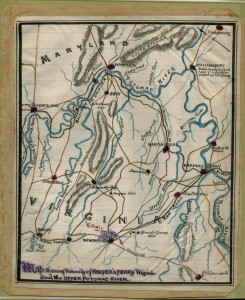
crossed the Potomac at Shepardstown on the 4th
When we reached Martinsburg, we found the whole army had gone, Generals and all, and we were ordered to cover their retreat to the Potomac at Shepardstown, which we did, crossing the river at sunrise on the morning of the Fourth of July. – And as the bells in many a northern village were ringing forth a joyous welcome to our country’s natal day, and you all at home were beginning to “celebrate,” we were slowly retreating before a victorious foe stopping now and then to check his advance and then falling suddenly back again. On we marched, passing through Sharpsburg, a place well remembered well remembered by many a Veteran of the “Old 33d,” falling back through Pleasant Valley until we again struck the Potomac, this time on the eastern side of Maryland heights, where we rested for the night, lying down in the road, holding our horses by the bridle as we slept.
The enemy now attacked Maryland Heights from the western side, captured Bolivar Heights, a very strong position, and occupied Harper’s Ferry almost without resistance, advanced their Infantry but were unable to get their Artillery in position to do much harm.
On Tuesday the Brigade went to Knoxville, up the Pike toward Frederick City, and then down toward Point of Rocks, but finding the country clear returned to Pleasant Valley. Next day we crossed Maryland Heights at Solomon’s Gap and attacked the left flank of the enemy, had a “right smart skirmish” and returned to our original position.
By this time our Brigade had become well nigh exhausted. Ten days of incessant marching and skirmishing, with only now and then an hour’s rest, without sleep and all this in the midst of a drought unprecedented in this section, began to tell upon the horses and men of the command. On Wednesday night however, we rested, the first rest since we left Bunker Hill, Va. But on Thursday morning the rebels advanced down Pleasant Valley and at them we went again. Two days more of fighting and we have driven them out and to-night all is quiet.

Harper’s Ferry from Maryland Heights 146 years later
The rebels are now burning the Quartermasters and commissary stores at Harper’s Ferry and are said to be retreating.
SATURDAY, July 9, 1864.
All is quiet this morning. The enemy has gone but which way is not yet certainly known. Gens. Sigel and Stahl are off too, having been superseded in command here by Gen. Howe. We expect to leave to day in pursuit of the foe. It is impossible to tell yet what our losses have been during the past week, put [sic] they are pretty heavy. All that I have heard of from Seneca Falls are Corporal Luther Waldo and private Nicholas Christy, both shot in the thigh. – Christy is wounded severely. Lt. Bacon is in command of company K just now, the 1st Lieut. being Adjutant General of the brigade. Many of the officers and men are completely worn out. I will send you a list of casualties in our regiment as soon as I can obtain one. Yours ever,
SENECA.
Mark Fickett’s 2010 photo of harper’s Ferry is licensed by Creative Commons

![Rich-Pete 1864 (Boston, [Mass.] : J.H. Bufford, [1864] ; LOC: http://www.loc.gov/item/001-ocm19089315/)](https://www.bluegrayreview.com/wp-content/uploads/2014/07/Rich-Pete-1864.py_-242x300.jpg)
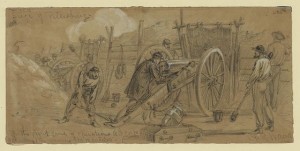
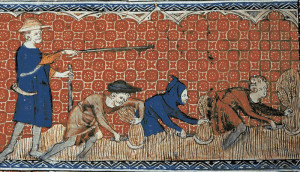
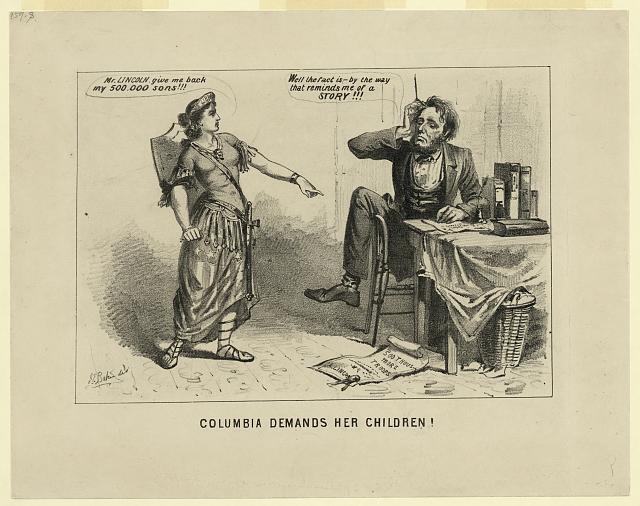
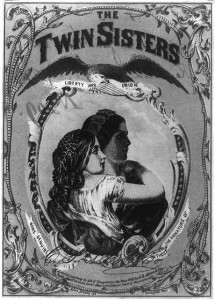
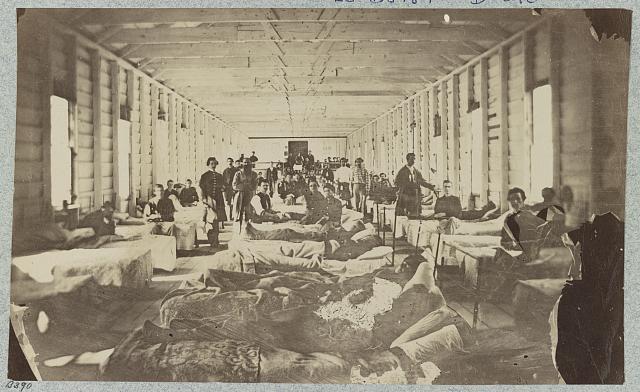
![[Civil War envelope showing portrait of Major General George B. McClellan inset in medallion decorated with eagle and American flags] (between 1861 and 1865; LOC: LC-DIG-ppmsca-34635)](https://www.bluegrayreview.com/wp-content/uploads/2014/07/34635r-300x172.jpg)
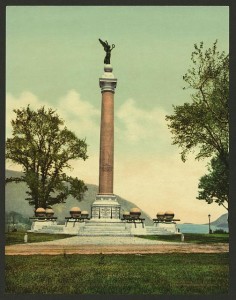

![[Memorial] "Lincoln under fire at Fort Stevens" (by Harris & Ewing, between 1915 and 1923; LOC: LC-DIG-hec-30172)](https://www.bluegrayreview.com/wp-content/uploads/2014/07/30172r.jpg)

